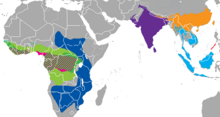Pholidota (taxon de animalia)
Pholidota es un ordine de mammiferos placentari appellate pangolin.
 | ||||||||||||||||||||||
| Classification scientific | ||||||||||||||||||||||
| ||||||||||||||||||||||
| Pholidota Weber, 1904 | ||||||||||||||||||||||
|
list of synonyms:
| ||||||||||||||||||||||
 Actual extension del pangolines.
| ||||||||||||||||||||||
Omne actual pangolines appertine al familia Manidae. Iste ordine es allargate al fossile species. Appertine al clado Pholidotamorpha qui es le kingruppo de Pancarnivora.
Phylogenia
modificar| Ferae |
| |||||||||||||||||||||||||||||||||||||||||||||||||||||||||||||||||||||
Referentias
modificar- ↑ "Odontogenic ameloblast-associated (ODAM) is inactivated in toothless/enamelless placental mammals and toothed whales" (December 2019). BMC Evolutionary Biology 19 (1): 31. doi:. PMID 30674270.
- ↑ "Abstracts of Papers" (1994). Journal of Vertebrate Paleontology 14: 1–58. doi:. Bibcode: 1994JVPal..14S...1..
- ↑ Lane, Henry Higgins (1910) "A corrected classification of the edentates." Science, new ser., vol. 31, pp. 913-914
- ↑ "Scientific names of mammal orders: from descriptive to uniform" (2008). Visnyk of Lviv University (48): 33–43.
- ↑ Haeckel, Ernst (1895). Systematische Phylogenie: Wirbelthiere T.3 (in de). Berlin: G. Reimer.
- ↑ "The Edentata of North America" (1889). American Naturalist 23 (272): 657–664. doi:.
- ↑ Kenneth E. Kinman (1994) "The Kinman System: Toward a Stable Cladisto-Eclectic Classification of Organisms: Living and Extinct, 48 Phyla, 269 Classes, 1,719 Orders", Hays, Kan. (P. O. Box 1377, Hays 67601), 88 pages
- ↑ Pearse, Arthur Sperry (1936). Zoological names. A list of phyla, classes, and orders, prepared for section F, American Association for the Advancement of Science. Duke University Press, 24.
- ↑ Edward Newman (1843) "The Zoologist: a monthly journal of natural history. (Vol. 1)", London, J. Van Voorst
- ↑ Murray, Andrew (1866) "The geographic distribution of mammals", London, Day and Son, Ltd., XVI + 420 pp., 101 maps
- ↑ Huxley, Thomas Henry (1872) "A manual of the anatomy of vertebrated animals", New York, d, Appleton and Co., 431 pp.
- ↑ "Classification of the Edentates" (1910). Science 32 (810). doi:. PMID 17745887.
